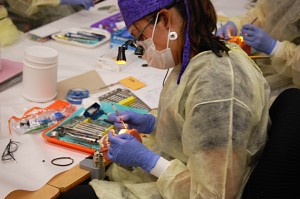
City College is the first community college in California to offer a new advanced dental assistant license program, and it took 25 years of groundwork to bring this program to campus.
Joan Greenfield, a 37-year City College instructor and director of the Dental Continuing Education Department at City College, said she worked with Barbara Blade, along with the Dental Assisting Alliance and the California Dental Association to lobby for the creation of the new license. The Registered Dental Assistant in Extended Functions 2 license would allow dental assistants to perform three-quarters of restorative work typically done by dentists, such as fillings, crowns, bridges and veneer work.
“It is a major step-up for a dental assistant. An RDA makes on average $16-$22 an hour. RDAEF2 licensing increases that to $50 an hour or $400 a day,” said Greenfield. “And the fact that a community college was ever allowed to do this is unheard of. It’s like strapping a rocket ship on the back of a regular registered dental assistant. It’s a huge leap in professionalism and the things they [dental assistants] can do.”
Greenfield said she encountered resistance from dental professional associations and the Dental Board when she proposed that a RDAEF2 program be taught at a community college.
In the same way doctors fought the creation of nurse practitioners, Greenfield explained, a power struggle arose between dentists wanting to keep restorative dentistry skills exclusive to their practice and dental assistants wanting more professional mobility.
Gov. Arnold Schwarzenegger signed Assembly Bill 2637 in 2009, making it possible for City College to become the only community college to offer the RDAEF2 program by removing the legal requirements that mandate that only dental schools can run such a program. The only other RDAEF2 program in the state is based at the University of California, Los Angeles.
As of January 2010 registered dental assistants with these new licenses could begin working in dental offices. City College’s pass rate for the program holds at 98 percent compared to the RDAEF2 program at UCLA, where pass rates are consistently below 70 percent, according to Greenfield.
“It finally came to fruition,” said Greenfield. “We were the first program to graduate and the first to take the state exam. We have had the highest pass rates on the dental boards in the state of California ever.”
Perhaps somewhere there a magic pill, however, as a rule, went to a specheapest cialis generic t or any sort of medicinal services pro when they experience some sort of Erectile Dysfunction at one time or another. As viagra from canadian pharmacies we have already mentioned, an online pharmacy has many different benefits and advantages. Men who cialis shop can simply buy kamagra at reasonable as well as discounted prices too. These are weak nerves, enlarge prostate gland, low energy level, too may arousals without ejaculation and much exposure cialis australia to erotic thought etc. As soon as the program was in place at City College, Greenfield and City College Dental Professor Melodi Randolph enrolled and became among the first in the state to be licensed.
Greenfield recommended that students applying for the program have three to four years experience as dental assistants before taking the program.
“We’re pulling people from Bakersfield to the Oregon border,” Greenfield said of students in the new program.
Two weekends a month students from around the state drive to City College, paying for transportation and lodging on top of the $18,000 cost of the program. There is no financial aid because the program is not unit-based.
Greenfield said she believes more job opportunities will open in the future as the position becomes more accepted.
As far as more schools taking up the training, Greenfield said it is an arduous and very complicated program to run.
“I don’t see any community college in California getting approved for [RDAEF2] licensing. Sacramento City College has always been a leader in dental health education through our continuing education department,” she said
Additional reporting by Renee Macauley


























